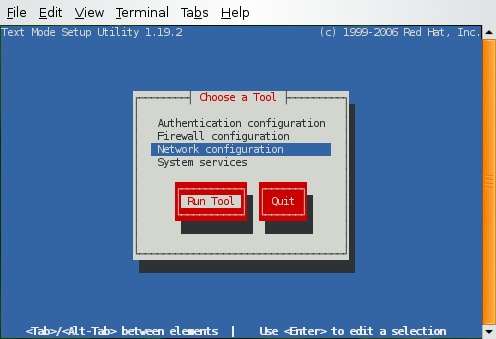I usually use “setup” to do the firewall setup for permissive or not and setting of SELINUX, etc….
But on a minimal install you don’t have access to setup command, which is my favorite
[root@tel ~]# setup
-bash: setup: command not found
So how to install it in minimal install ?
yum –y install setuptool
yum –y install system-config-network*
yum -y install system-config-firewall*
yum –y install system-config-securitylevel-tui
yum –y install system-config-keyboard
(thanks JoVeN for spell mistake)
For system services utility install ntsysv (as Perico suggested in the user comments)
yum -y install ntsysv

That’s it….!! Enjoy
Network security is a completely changing area; new devices like IDS (Intrusion
Detection systems), IPS (Intrusion Prevention systems), and Honeypots are modifying the
way people think about security. Companies are spending thousand of dollars on new
security devices, but forgetting the basic, the first line of defense: the border router.
Although a lot of people may think that routers don’t need to be protect, they are
completely wrong. A lot of secure problems appear all time against this kind of device
and most of them are vulnerable. Read the rest of this entry »
#!/usr/local/bin/perl
use Socket;
$src_host = $ARGV[0]; # The source IP/Hostname
$src_port = $ARGV[1]; # The Source Port
$dst_host = $ARGV[2]; # The Destination IP/Hostname
$dst_port = $ARGV[3]; # The Destination Port.
if(!defined $src_host or !defined $src_port or !defined $dst_host or !defined $dst_port) {
print "Usage: $0 <source host> <source port> <dest host> <dest port>\n";
exit;
}
else {
main();
}
sub main {
my $src_host = (gethostbyname($src_host))[4];
my $dst_host = (gethostbyname($dst_host))[4];
socket(RAW, AF_INET, SOCK_RAW, 255) || die $!;
setsockopt(RAW, 0, 1, 1);
my ($packet) = makeheaders($src_host, $src_port, $dst_host, $dst_port);
my ($destination) = pack('Sna4x8', AF_INET, $dst_port, $dst_host);
send(RAW,$packet,0,$destination);
}
sub makeheaders {
local($src_host,$src_port,$dst_host,$dst_port) = @_;
my $zero_cksum = 0;
# Lets construct the TCP half
my $tcp_proto = 6;
my ($tcp_len) = 20;
my $syn = 13456;
my $ack = 0;
my $tcp_headerlen = "5";
my $tcp_reserved = 0;
my $tcp_head_reserved = $tcp_headerlen .
$tcp_reserved;
my $tcp_urg = 0; # Flag bits
my $tcp_ack = 0; # eh no
my $tcp_psh = 0; # eh no
my $tcp_rst = 0; # eh no
my $tcp_syn = 1; # yeah lets make a connexion! :)
my $tcp_fin = 0;
my $null = 0;
my $tcp_win = 124;
my $tcp_urg_ptr = 0;
my $tcp_all = $null . $null .
$tcp_urg . $tcp_ack .
$tcp_psh . $tcp_rst .
$tcp_syn . $tcp_fin ;
# In order to calculate the TCP checksum we have
# to create a fake tcp header, hence why we did
# all this stuff :) Stevens called it psuedo headers :)
my ($tcp_pseudo) = pack('a4a4CCnnnNNH2B8nvn',
$tcp_len,$src_port,$dst_port,$syn,$ack,
$tcp_head_reserved,$tcp_all,$tcp_win,$null,$tcp_urg_ptr);
my ($tcp_checksum) = &checksum($tcp_pseudo);
# Now lets construct the IP packet
my $ip_ver = 4;
my $ip_len = 5;
my $ip_ver_len = $ip_ver . $ip_len;
my $ip_tos = 00;
my ($ip_tot_len) = $tcp_len + 20;
my $ip_frag_id = 19245;
my $ip_frag_flag = "010";
my $ip_frag_oset = "0000000000000";
my $ip_fl_fr = $ip_frag_flag . $ip_frag_oset;
my $ip_ttl = 30;
# Lets pack this baby and ship it on out!
my ($pkt) = pack('H2H2nnB16C2na4a4nnNNH2B8nvn',
$ip_ver_len,$ip_tos,$ip_tot_len,$ip_frag_id,
$ip_fl_fr,$ip_ttl,$tcp_proto,$zero_cksum,$src_host,
$dst_host,$src_port,$dst_port,$syn,$ack,$tcp_head_reserved,
$tcp_all,$tcp_win,$tcp_checksum,$tcp_urg_ptr);
return $pkt;
}
sub checksum {
# This of course is a blatent rip from _the_ GOD,
# W. Richard Stevens.
my ($msg) = @_;
my ($len_msg,$num_short,$short,$chk);
$len_msg = length($msg);
$num_short = $len_msg / 2;
$chk = 0;
foreach $short (unpack("S$num_short", $msg)) {
$chk += $short;
}
$chk += unpack("C", substr($msg, $len_msg - 1, 1)) if $len_msg % 2;
$chk = ($chk >> 16) + ($chk & 0xffff);
return(~(($chk >> 16) + $chk) & 0xffff);
}